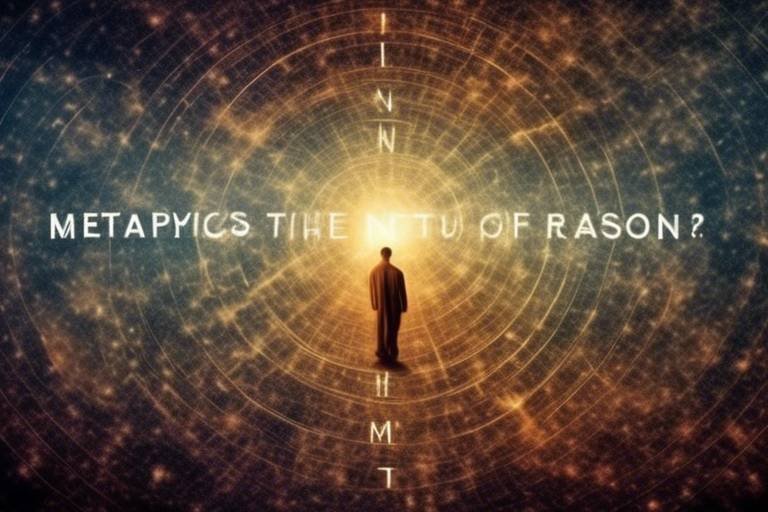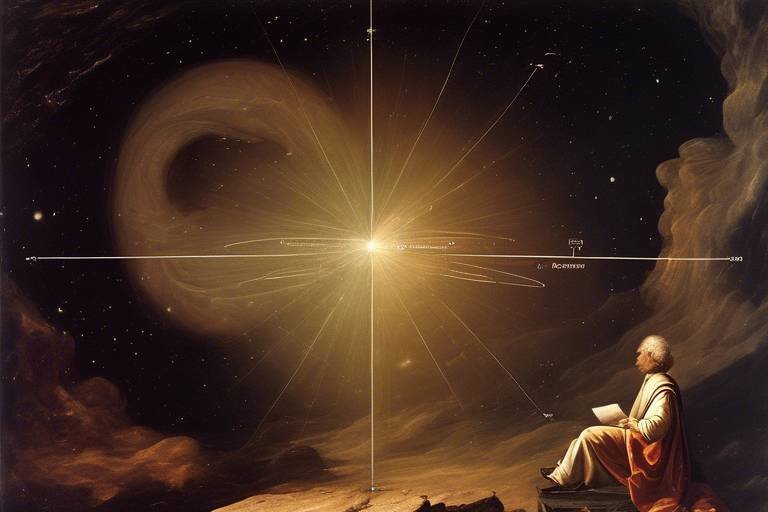Metaphysics – Decrypting the Principle of Sufficient Reason
The world around us is brimming with questions, mysteries, and phenomena that often leave us scratching our heads. Have you ever pondered why things are the way they are? Why does one event lead to another? This is where the Principle of Sufficient Reason (PSR) steps in, acting as a philosophical compass that guides our understanding of existence, causality, and the very fabric of reality itself. The PSR asserts that nothing happens without a reason; every occurrence, every state of affairs, must have an explanation. This principle is not just a dry philosophical concept but a vibrant thread woven into the tapestry of our understanding of the universe.
Imagine standing at the edge of a vast ocean, each wave representing a question about existence. The PSR is like a lighthouse, illuminating the reasons behind those waves. It invites us to explore deeper, to seek the underlying causes of our experiences. In this article, we will embark on a journey through the realms of metaphysics, exploring the implications of the PSR and how it shapes our worldview. From its historical roots to its modern interpretations, and its applications in science, the PSR is a concept that continues to resonate, challenging us to think critically about reality and our place within it.
As we delve into this exploration, we will also confront the critiques and counterarguments that have emerged over time. Can we truly assert that everything has a reason? What happens when we encounter phenomena that defy our traditional understanding of causality? These questions not only enrich our philosophical discussions but also push the boundaries of scientific inquiry.
Ultimately, the Principle of Sufficient Reason serves as a pivotal concept in metaphysics, urging us to question, to seek, and to understand. So, buckle up as we navigate the intricate pathways of thought that this principle opens up, and prepare to challenge your perceptions of reality!
- What is the Principle of Sufficient Reason?
The PSR states that everything must have a reason or explanation for its existence or occurrence.
- Who is associated with the Principle of Sufficient Reason?
Gottfried Wilhelm Leibniz is often credited with formalizing the PSR in philosophical discourse.
- How does the PSR apply to modern science?
The PSR influences scientific theories by asserting that events must have causal explanations.
- What are some critiques of the PSR?
Critics argue that not all events may have a discernible reason, particularly in the realm of quantum mechanics.

Understanding the Principle of Sufficient Reason
The Principle of Sufficient Reason (PSR) is a cornerstone of philosophical inquiry that asserts that everything must have a reason, cause, or explanation. Imagine standing in front of a vast ocean; each wave that crashes upon the shore doesn’t just appear out of nowhere. It is the result of complex interactions between wind, water, and gravity. Similarly, the PSR suggests that nothing in our universe is without a cause or rationale. This principle invites us to explore the very fabric of existence, pushing us to ask, “Why is there something rather than nothing?”
Historically, the PSR has been a topic of heated discussion among philosophers and scientists alike. Its implications stretch far beyond mere abstract thought; it challenges us to consider the nature of reality itself. The principle can be seen as a guiding light in metaphysics, steering discussions around causality, existence, and the interconnectedness of all things. When we say that everything has a reason, we are not just engaging in philosophical jargon; we are exploring the very essence of what it means to exist.
To fully grasp the PSR, one must consider its role in various domains of thought. It raises questions about the universe's origins and the nature of causality. For instance, if every event has a reason, what does that imply about the beginning of the universe? Can we trace back the chain of causation indefinitely, or is there a fundamental starting point that requires explanation? These inquiries lead us into the realms of cosmology and metaphysics, where the PSR acts as a bridge connecting philosophical thought with scientific exploration.
Moreover, the PSR is not merely an abstract concept; it has practical implications. In everyday life, we often seek reasons behind our experiences. When we encounter a problem, we instinctively look for its cause to understand and resolve it. This tendency mirrors the PSR, as it underscores our innate desire to make sense of the world around us. Whether it’s the weather, human behavior, or the mysteries of the universe, the quest for understanding is a fundamental aspect of our existence.
As we delve deeper into the implications of the PSR, we must also recognize its limitations and the critiques it faces. Some argue that not everything can be neatly explained or rationalized. Events at the quantum level, for instance, seem to defy traditional notions of causality, raising questions about whether the PSR holds true in all contexts. This ongoing dialogue between proponents and critics of the PSR enriches our understanding of metaphysical inquiry, prompting us to consider alternative perspectives.
In conclusion, the Principle of Sufficient Reason is a profound concept that invites us to question the nature of existence and causality. By asserting that everything must have a reason, it challenges us to seek deeper understanding and connection in our exploration of reality. As we continue to investigate the implications of this principle, we pave the way for new insights into the universe and our place within it.

Historical Background
The Principle of Sufficient Reason (PSR) has roots that stretch deep into the annals of philosophical thought, echoing through the ages from ancient Greece to the modern era. Its fundamental assertion—that everything must have an explanation or reason—has sparked debates, discussions, and even disagreements among some of the greatest minds in history. This principle is not merely a philosophical curiosity; it serves as a cornerstone for understanding existence and causality. But how did we arrive at this pivotal idea?
To grasp the evolution of the PSR, we must first look back to the ancient philosophers. Thinkers like Aristotle laid the groundwork by questioning the nature of existence and causality. Aristotle's exploration of causes—material, formal, efficient, and final—hinted at the necessity of reasons behind phenomena. Fast forward to the Middle Ages, where Thomas Aquinas expanded on these ideas, integrating them with theological concepts. He argued that everything that exists must have a reason for its existence, which ultimately leads back to the divine.
However, it was the early modern philosopher Gottfried Wilhelm Leibniz who truly formalized the Principle of Sufficient Reason. In the 17th century, Leibniz articulated the PSR with clarity and precision, asserting that "nothing happens without a sufficient reason." His work provided a robust framework that would influence countless philosophers and scientists. Leibniz's contributions are particularly notable because they sought to reconcile faith with reason, showing that philosophical inquiry could coexist with religious belief.
As we journey through the centuries, we encounter a variety of interpretations and adaptations of the PSR. The Enlightenment brought forth thinkers like David Hume, who challenged the very foundations of causality. Hume's skepticism about causation questioned whether we could ever truly know the reasons behind events, thereby shaking the foundations of the PSR. His arguments posed significant challenges that would resonate in philosophical discourse for generations.
In the 19th and 20th centuries, the PSR faced further scrutiny from existentialists and nihilists, who questioned the very necessity of reasons in a seemingly chaotic universe. Thinkers such as Friedrich Nietzsche and Jean-Paul Sartre suggested that existence precedes essence, implying that life might not require a grand reason at all. This shift in perspective prompted a reevaluation of the PSR's relevance in contemporary thought.
In summary, the historical trajectory of the Principle of Sufficient Reason reflects a rich tapestry of philosophical inquiry. From its ancient origins to its modern interpretations, the PSR has not only shaped metaphysical discussions but also influenced scientific paradigms. As we continue to explore this principle, we find ourselves at a crossroads of thought, where questions about existence, causality, and the nature of reality continue to provoke and inspire.
- What is the Principle of Sufficient Reason? The PSR posits that everything must have a reason or explanation for its existence or occurrence.
- Who first formalized the Principle of Sufficient Reason? The principle was notably formalized by Gottfried Wilhelm Leibniz in the 17th century.
- How has the PSR influenced modern philosophy? The PSR has sparked debates and discussions about causality, existence, and the nature of reality, influencing both metaphysics and science.
- What are some critiques of the Principle of Sufficient Reason? Critics like David Hume have questioned the necessity of reasons behind events, suggesting that our understanding of causality may be limited.

Leibniz and the Principle
Gottfried Wilhelm Leibniz, a towering figure in the realm of philosophy, is often recognized as the one who meticulously formalized the Principle of Sufficient Reason (PSR). This principle asserts that everything must have a reason or explanation for its existence. Imagine walking into a room and finding a painting on the wall; you would naturally wonder who painted it and why it was placed there. Similarly, Leibniz's philosophy compels us to seek reasons behind every phenomenon in the universe, from the simplest events to the most complex systems.
Leibniz proposed that not only does everything that exists require an explanation, but also that there must be a sufficient reason for why things are the way they are. He argued that if something exists, there must be a reason for its existence rather than nothing. This assertion leads us to consider profound questions about the nature of reality and existence itself.
One of the core tenets of Leibniz's argument is that the universe is a rational structure governed by laws. He believed that the existence of the universe is not just a random occurrence but is instead a reflection of a deeper order. In his view, the universe is akin to a well-crafted machine, where every cog and wheel has its purpose and place. This analogy underscores the importance of understanding the interconnections and reasons behind each element of existence.
Leibniz's exploration of the Principle of Sufficient Reason can be summarized through several key arguments:
- Existence Requires Explanation: Leibniz posited that for anything to exist, there must be a reason that explains its existence.
- Contingency and Necessity: He distinguished between contingent beings (those that could either exist or not) and necessary beings (those that must exist). The existence of contingent beings requires a sufficient reason outside themselves.
- The Principle of Harmony: Leibniz believed that the universe operates in a harmonious manner, where every event is interconnected and contributes to the overall order of existence.
These arguments laid the groundwork for future metaphysical inquiries, influencing not just philosophy but also the development of modern science. Leibniz's insistence on rationality and explanation paved the way for a systematic exploration of existence, leading thinkers to grapple with the implications of his ideas.
However, it is essential to recognize that Leibniz's views did not go unchallenged. Critics have pointed out various issues with his interpretations, questioning the validity of his claims and the universality of the Principle of Sufficient Reason. Nonetheless, the impact of Leibniz's work remains undeniable, as it continues to provoke thought and discussion among philosophers and scientists alike.

Leibniz's Arguments
Gottfried Wilhelm Leibniz, a towering figure in the realm of philosophy, made significant contributions to the development of the Principle of Sufficient Reason (PSR). His arguments center around the idea that nothing happens without a reason; every event, every existence, and every truth must have an adequate explanation. This is not merely a philosophical musing; for Leibniz, it was a fundamental tenet that underpinned the very fabric of reality itself.
One of Leibniz's most compelling assertions was that the existence of the universe itself requires justification. He argued that if everything could exist without a reason, then it would lead to an absurdity where anything could happen at any time, undermining the very concept of causality. In his view, the universe is not just a collection of random occurrences but a coherent system governed by laws that can be understood through reason. This is where the PSR shines, as it provides a framework to explore why things are the way they are.
To illustrate his point, Leibniz introduced the notion of possible worlds. He posited that for every existing thing, there is a possible world where it could be different. This idea helps us to comprehend the necessity of reasons behind existence. If something exists, it must be because it is the best of all possible worlds; hence, it has a sufficient reason for being. This concept not only emphasizes the interconnectedness of all things but also suggests that the universe is optimized for existence and rationality.
Moreover, Leibniz's arguments extend into the realm of causality. He maintained that every effect must have a cause, a notion that resonates with our intuitive understanding of the world. For example, consider a domino effect: when the first domino falls, it causes the next one to fall, and so forth. Leibniz would argue that this chain reaction exemplifies the PSR, as each domino's fall is not arbitrary but a consequence of the previous one. Without this chain of reasoning, we would be left with a chaotic universe devoid of meaning.
However, Leibniz also faced challenges in his arguments. Critics pointed out that the PSR could lead to infinite regress, where every reason necessitates another reason ad infinitum. This potential pitfall raised questions about the ultimate foundation of existence itself. Nevertheless, Leibniz countered this by suggesting that there must be a necessary being, an ultimate reason that itself does not require further justification. This being, he argued, is God, who embodies the essence of reason and existence.
In summary, Leibniz's arguments for the Principle of Sufficient Reason provide a robust framework for understanding existence, causality, and the nature of reality. His insistence that everything must have a reason not only challenges us to think deeply about the world around us but also invites us to explore the profound connections that bind us to the universe. As we delve further into metaphysical inquiries, the echoes of Leibniz's thoughts continue to resonate, urging us to seek explanations and understand the reasons behind our existence.
- What is the Principle of Sufficient Reason?
The Principle of Sufficient Reason posits that everything must have a reason or explanation for its existence or occurrence.
- Who is Gottfried Wilhelm Leibniz?
Leibniz was a German philosopher, mathematician, and logician known for his contributions to metaphysics and the formalization of the Principle of Sufficient Reason.
- How does the Principle of Sufficient Reason relate to causality?
The PSR asserts that every effect must have a cause, reinforcing the idea that events are interconnected and not random occurrences.
- What are possible worlds in Leibniz's philosophy?
Possible worlds are hypothetical scenarios that illustrate how things could be different, emphasizing the necessity of reasons behind existence.

Critiques of Leibniz
The Principle of Sufficient Reason, while foundational in metaphysical discussions, has not escaped scrutiny. Critics have raised significant concerns regarding Leibniz's assertions that everything must have a reason or explanation. One of the primary critiques comes from the realm of existentialism, where philosophers argue that not everything in existence requires a justification. This perspective suggests that life can be inherently absurd, and meaning is not always derived from rational explanations. The existentialists challenge the notion that everything must be understood through a lens of causality.
Moreover, some philosophers, such as David Hume, questioned the very nature of causality itself. Hume posited that our understanding of cause and effect is based on habit rather than logical necessity. He argued that we cannot assume that every event has a preceding cause simply because we observe patterns in the natural world. This skepticism raises significant doubts about the universality of the Principle of Sufficient Reason. If causality is not a given, then the principle may not hold in all contexts, particularly in the realm of human experience.
Another critique arises from the developments in modern science, especially in the field of quantum mechanics. Quantum phenomena, such as particle behavior, often defy classical explanations of causality. For instance, the concept of particles being in multiple states at once until observed challenges the deterministic view that Leibniz's principle implies. This unpredictability suggests that there may be events that occur without a clear reason, thus undermining the principle's validity in explaining the fabric of reality.
Additionally, some critics argue that the Principle of Sufficient Reason may lead to an infinite regress of explanations. If every event requires a reason, one might ask, "What is the reason for the reason?" This line of questioning can spiral into an endless chain of justifications, which seems impractical and philosophically unsatisfying. Critics suggest that this could ultimately render the principle unhelpful in providing meaningful insights into the nature of existence.
In summary, while Leibniz's Principle of Sufficient Reason has had a profound impact on metaphysical thought, it faces substantial critiques that question its universality and applicability. These critiques highlight the complexities of existence and causality, suggesting that perhaps not everything in our universe can be neatly explained or justified. As philosophical inquiry continues to evolve, the debates surrounding Leibniz's principle remain a vibrant part of the discourse.
- What is the Principle of Sufficient Reason?
The Principle of Sufficient Reason states that everything must have a reason or explanation for its existence or occurrence. It is a fundamental concept in metaphysics that seeks to understand causality and existence.
- Who is Gottfried Wilhelm Leibniz?
Gottfried Wilhelm Leibniz was a German philosopher and mathematician who is credited with formalizing the Principle of Sufficient Reason. His work laid the groundwork for many metaphysical inquiries that followed.
- How does quantum mechanics challenge the Principle of Sufficient Reason?
Quantum mechanics introduces concepts that defy classical causality, such as particles existing in multiple states. This unpredictability raises questions about whether all events can be explained by preceding causes.
- What are some critiques of Leibniz's principle?
Critiques include existentialist views that argue not everything requires justification, Hume's skepticism about causality, and concerns about infinite regress in explanations.

Modern Interpretations
The Principle of Sufficient Reason (PSR) has undergone significant reinterpretation in modern philosophy, reflecting the evolving landscape of metaphysical inquiry. Philosophers today grapple with the implications of PSR in light of advancements in science and shifts in philosophical paradigms. One of the most striking developments is the way in which the PSR interacts with contemporary theories of existence and causality. In this context, the PSR is not merely a philosophical abstraction; it becomes a lens through which we can examine the very fabric of reality.
In modern discussions, the PSR is often scrutinized alongside concepts from quantum mechanics, where traditional notions of causality are challenged. For instance, the behavior of particles at quantum levels seems to defy the deterministic framework that the PSR implies. This has led to a fascinating dialogue between metaphysics and physics, where thinkers like David Albert and others have explored how quantum indeterminacy might offer a counter-narrative to the PSR. Are events truly without reason, or is our understanding of "reason" simply too limited? This question sparks a vibrant debate that continues to evolve.
Moreover, modern interpretations of the PSR also engage with existentialist and nihilistic philosophies. Thinkers such as Jean-Paul Sartre and Friedrich Nietzsche provide compelling counterpoints to the PSR, suggesting that existence might not require a sufficient reason at all. This perspective raises profound questions: If existence can be seen as random or devoid of inherent meaning, what does that imply for the PSR? The implications are vast and complex, leading to a rich tapestry of thought where the PSR must contend with the notion of absurdity and the search for meaning.
As we navigate these modern interpretations, it's essential to recognize that the PSR remains a pivotal concept that challenges us to think critically about existence, causality, and reality itself. The interplay between the PSR and contemporary philosophical thought not only enriches our understanding but also invites us to reconsider our assumptions about the universe. In this ever-evolving discourse, the Principle of Sufficient Reason stands as both a beacon of philosophical inquiry and a battleground for competing ideas.
- What is the Principle of Sufficient Reason?
The Principle of Sufficient Reason states that everything must have a reason or explanation for its existence or occurrence. - How has the Principle of Sufficient Reason evolved over time?
Initially articulated by philosophers like Leibniz, the PSR has been reinterpreted in light of modern scientific discoveries and philosophical debates. - What challenges does quantum mechanics pose to the PSR?
Quantum mechanics introduces elements of randomness and indeterminacy, which seem to conflict with the deterministic implications of the PSR. - Can existentialism and nihilism coexist with the Principle of Sufficient Reason?
These philosophies challenge the necessity of a sufficient reason for existence, suggesting that meaning may not be inherent in the universe.

Applications in Science
The Principle of Sufficient Reason (PSR) is not just a philosophical abstraction; it has profound implications in the realm of science. At its core, the PSR asserts that everything that exists must have a reason for its existence, and this principle can be seen influencing various scientific theories and methodologies. For instance, in physics, the quest for understanding the universe often revolves around identifying causes and effects, making the PSR a foundational concept in scientific inquiry. Imagine trying to solve a mystery without knowing the backstory—it's nearly impossible! This is similar to how scientists approach their research, seeking reasons behind phenomena to build a coherent understanding of the natural world.
One of the most fascinating areas where the PSR finds application is in the field of quantum mechanics. Quantum mechanics challenges our traditional notions of causality and determinism, presenting a unique landscape where events can seem to occur without clear reasons. Yet, even in this seemingly chaotic realm, the PSR can serve as a guiding principle. Scientists are continually grappling with questions like: "What causes particles to behave in such unpredictable ways?" or "Is there an underlying reason for quantum events?" These inquiries reflect the deep-seated belief in the PSR, pushing researchers to seek explanations that can account for the randomness observed in quantum phenomena.
Furthermore, the role of causality in scientific discourse cannot be overstated. Causality provides a framework through which we can understand the relationships between different events and phenomena. In many ways, it acts as the glue that holds scientific theories together. Consider the following applications of the PSR in various scientific disciplines:
| Scientific Discipline | Application of PSR |
|---|---|
| Physics | Explaining the laws of motion and gravitation through causal relationships. |
| Chemistry | Understanding chemical reactions by identifying reactants and products. |
| Biology | Investigating the causes of genetic mutations and their effects on evolution. |
| Psychology | Exploring the reasons behind human behavior and mental processes. |
As we can see from the table above, the PSR plays an integral role across various scientific disciplines. In biology, for instance, researchers often seek to understand the reasons behind genetic mutations. Why does a mutation occur? What are its effects on an organism's survival? These questions exemplify the PSR in action, as scientists strive to uncover the underlying reasons that shape life itself.
Moreover, the PSR encourages a systematic approach to scientific investigation. By demanding that every phenomenon has a reason, it fosters a culture of inquiry that is essential for scientific progress. This principle not only drives researchers to seek explanations but also helps in forming hypotheses that can be tested and validated, ultimately leading to advancements in knowledge and technology.
In summary, the Principle of Sufficient Reason is deeply embedded in the fabric of scientific exploration. It compels scientists to look beyond mere observations and delve into the "why" of existence, shaping our understanding of causality and reality. As we continue to explore the universe, the PSR will undoubtedly remain a pivotal concept, guiding us toward deeper insights and discoveries.
- What is the Principle of Sufficient Reason?
The Principle of Sufficient Reason states that everything must have a reason or explanation for its existence or occurrence. - How does the PSR apply to science?
The PSR influences scientific inquiry by compelling researchers to seek explanations for phenomena, shaping theories across various disciplines. - Can the PSR be applied in quantum mechanics?
Yes, while quantum mechanics challenges traditional notions of causality, the PSR still serves as a guiding principle for understanding underlying reasons behind quantum events. - Why is causality important in science?
Causality helps establish relationships between events, providing a framework for scientific theories and facilitating a deeper understanding of the natural world.

Quantum Mechanics
When we dive into the realm of , we encounter a fascinating world that challenges our traditional understanding of reality. Imagine a universe where particles can exist in multiple states at once, and where the act of observation can alter the very fabric of existence. This is not just science fiction; it's the core of quantum theory. The Principle of Sufficient Reason, which asserts that everything must have a reason or cause, finds itself in a bit of a pickle when faced with the peculiarities of quantum mechanics.
At the heart of quantum mechanics lies the famous Heisenberg Uncertainty Principle, which states that we cannot precisely measure both the position and momentum of a particle at the same time. This uncertainty challenges the classical notion of causality, where every effect has a clear cause. In the quantum realm, events can occur without definitive reasons, leading to a paradox where the Principle of Sufficient Reason seems to falter. For instance, consider the phenomenon of quantum entanglement, where particles become interconnected in such a way that the state of one instantly influences the state of another, regardless of the distance separating them. This phenomenon raises questions about whether we can truly apply a rational framework to understand such interactions.
Moreover, quantum mechanics introduces the concept of superposition, where particles can exist in multiple states until measured. This leads to scenarios where causality appears to be non-linear. Imagine flipping a coin that can be both heads and tails until you look at it. This blurs the lines of causation and calls into question whether every event indeed has a sufficient reason behind it. The implications of these ideas are profound, suggesting that at the quantum level, the universe might operate under different rules than those we observe in our everyday lives.
To illustrate how quantum mechanics interacts with the Principle of Sufficient Reason, we can consider the following table that summarizes key concepts:
| Concept | Description |
|---|---|
| Superposition | A particle's ability to exist in multiple states simultaneously until measured. |
| Entanglement | A phenomenon where particles become linked, and the state of one can instantly affect the state of another. |
| Uncertainty Principle | The idea that certain pairs of physical properties cannot be simultaneously known to arbitrary precision. |
These quantum phenomena challenge the traditional interpretations of causality and the Principle of Sufficient Reason. Some philosophers argue that if quantum events can occur without clear causes, then perhaps the principle itself is not universally applicable. Others, however, suggest that the principle may still hold, but in a more complex form that we have yet to fully understand.
In conclusion, quantum mechanics presents a perplexing challenge to the Principle of Sufficient Reason. As we continue to explore the intricacies of the quantum world, we may find that our understanding of existence, causality, and reality itself is far more nuanced than we ever imagined. The dialogue between quantum mechanics and metaphysics is ongoing, and it promises to yield fascinating insights into the nature of our universe.
- What is the Principle of Sufficient Reason? It is the philosophical principle that states everything must have a reason or cause.
- How does quantum mechanics challenge traditional causality? Quantum mechanics introduces concepts like superposition and entanglement, which suggest events can occur without clear causes.
- Can the Principle of Sufficient Reason still apply in quantum mechanics? Some argue it may hold in a more complex form, while others believe it may not be universally applicable.

The Role of Causality
The concept of causality is at the very heart of the Principle of Sufficient Reason (PSR). To put it simply, causality is the relationship between causes and effects, the driving force that shapes our understanding of how things happen in the universe. Have you ever wondered why things occur the way they do? Why a seed grows into a tree, or why a storm brews on the horizon? These questions stem from our inherent desire to find reasons behind events, and that's where causality comes into play.
Causality is not just a philosophical notion; it's a fundamental aspect of our everyday lives. We rely on it to make sense of the world around us. For instance, when you flip a light switch, you expect the room to brighten because you know that the action of flipping the switch causes the light to turn on. This cause-and-effect relationship is so ingrained in our thinking that we often take it for granted. However, when we dive deeper into the realms of metaphysics and science, the implications of causality become significantly more complex.
The PSR asserts that everything must have a reason, and causality is the framework through which we explore these reasons. In metaphysical discussions, causality helps us to understand not only why things happen but also the nature of existence itself. It raises questions about determinism and free will. If every event has a cause, does that mean our choices are predetermined? Or is there room for randomness and unpredictability? These inquiries are pivotal in both philosophical and scientific contexts.
Moreover, causality serves as a bridge between metaphysics and empirical science. In scientific inquiry, establishing causality is crucial for validating theories and experiments. For example, in a controlled experiment, researchers manipulate one variable (the cause) to observe the effect it has on another variable. This method allows scientists to draw conclusions about the relationships between different phenomena. The table below summarizes some key aspects of causality in scientific inquiry:
| Aspect | Description |
|---|---|
| Cause | The factor that produces an effect. |
| Effect | The result that occurs due to the cause. |
| Correlation | A relationship between two variables, but not necessarily causal. |
| Experimentation | Manipulating variables to observe causal relationships. |
In the realm of modern physics, the relationship between causality and the PSR becomes even more intriguing. Quantum mechanics, for example, challenges traditional views of causality. In quantum theory, particles can exist in multiple states at once, and their behavior can seem random and unpredictable. This has led to debates about whether causality holds true at the quantum level, raising questions about the very fabric of reality. If events can occur without a clear cause, what does that mean for the PSR? The interplay between causality and quantum mechanics illustrates the evolving nature of our understanding of existence and reality.
Ultimately, the role of causality within the framework of the Principle of Sufficient Reason is both profound and complex. It anchors our philosophical inquiries while simultaneously informing scientific exploration. As we continue to unravel the mysteries of existence and reality, the relationship between causes and effects will remain a vital area of study, pushing the boundaries of what we know and understand.
- What is the Principle of Sufficient Reason? - It is the philosophical principle that everything must have a reason or explanation for its existence or occurrence.
- How does causality relate to the Principle of Sufficient Reason? - Causality provides the framework for understanding the reasons behind events, making it a crucial aspect of the PSR.
- Can causality exist in quantum mechanics? - Quantum mechanics challenges traditional notions of causality, leading to ongoing debates about its validity at the quantum level.
- Why is understanding causality important? - Understanding causality helps us make sense of the world, validate scientific theories, and explore deeper philosophical questions.

Critiques and Counterarguments
The Principle of Sufficient Reason (PSR) has not gone unchallenged in the annals of philosophical discourse. While it serves as a cornerstone for understanding causality and existence, various critiques have emerged, questioning its validity and applicability. One of the most significant challenges comes from existentialist and nihilistic perspectives, which argue that life and existence do not inherently require justification. This leads to a compelling question: if everything needs a reason, what about the very existence of reasons themselves?
Critics often point out that the PSR can lead to an infinite regress of explanations. Imagine a scenario where every event requires a reason, and that reason itself necessitates another reason. This creates a chain that could theoretically extend infinitely. Some philosophers argue that this is not only impractical but also philosophically troubling. They propose that there may be some events or states of affairs that simply exist without requiring an explanation. This perspective challenges the very foundation of the PSR, suggesting that not everything needs to be justified or explained.
Moreover, the advent of modern physics, particularly quantum mechanics, has raised eyebrows regarding the PSR's applicability. Quantum events, such as the behavior of particles at the subatomic level, often appear random and uncaused. This randomness contradicts the deterministic view that the PSR seems to promote. For instance, consider the phenomenon of quantum entanglement, where particles become interlinked in ways that defy classical explanations. Many scientists and philosophers argue that these quantum anomalies suggest that not all events require a sufficient reason, thus undermining the PSR's universality.
To further illustrate the critiques, let's examine a few key counterarguments:
- Existentialism: Philosophers like Jean-Paul Sartre argue that existence precedes essence, meaning that individuals are not defined by a predetermined purpose or reason.
- Nihilism: This perspective posits that life lacks inherent meaning or value, challenging the necessity of reasons for existence.
- Quantum Mechanics: The unpredictable nature of quantum events raises questions about causality and the PSR's relevance in the scientific realm.
These critiques not only challenge the PSR but also open up a broader discussion about the nature of existence and reality. If we accept that some phenomena exist without sufficient reasons, we may need to reconsider our understanding of causality and the framework within which we analyze existence. The implications of rejecting the PSR are profound and invite further inquiry into the nature of reality itself.
- What is the Principle of Sufficient Reason? The PSR states that everything must have a reason or explanation for its existence or occurrence.
- Who is associated with the formalization of the PSR? Gottfried Wilhelm Leibniz is credited with formalizing the PSR and significantly contributing to its philosophical discourse.
- How does quantum mechanics challenge the PSR? Quantum mechanics introduces randomness and uncertainty, suggesting that not all events can be explained through traditional causal frameworks.
- What are the implications of rejecting the PSR? Rejecting the PSR could lead to a reevaluation of our understanding of causality and existence, potentially embracing a more existential or nihilistic viewpoint.

Existential and Nihilistic Perspectives
The Principle of Sufficient Reason (PSR) faces a formidable challenge from existential and nihilistic perspectives. These philosophical schools of thought question the very foundations of meaning, existence, and the necessity of reasons behind events. Existentialists, like Jean-Paul Sartre and Albert Camus, argue that life is inherently absurd and devoid of predetermined purpose. They suggest that individuals must create their own meaning in a universe that does not inherently provide it. This view directly opposes the PSR, which insists that everything must have a reason or explanation. If existence is fundamentally absurd, then the search for reasons becomes a futile endeavor.
Nihilism takes this skepticism a step further by asserting that not only is life devoid of objective meaning, but that all values and beliefs are baseless. Friedrich Nietzsche, a prominent nihilist thinker, famously proclaimed that "God is dead," highlighting the collapse of traditional values and the implications this has for the human search for meaning. In this context, the PSR is challenged by the notion that even if reasons exist, they may be arbitrary or constructed rather than inherent to reality. This raises profound questions: If everything is ultimately meaningless, does the search for reasons still hold value? Are we merely fabricating narratives to cope with an indifferent universe?
To illustrate the tension between these perspectives and the PSR, consider the following table:
| Perspective | View on Meaning | Relation to PSR |
|---|---|---|
| Existentialism | Meaning is self-created | Challenges the need for external reasons |
| Nihilism | Life is inherently meaningless | Questions the validity of any reasons |
These existential and nihilistic perspectives provoke deep reflection on the implications of rejecting the PSR. If we accept that existence lacks inherent meaning, the traditional philosophical quest for reasons may seem obsolete. The implications are profound: if reasons are not necessary or even nonexistent, how do we navigate our understanding of reality? This leads to a paradox where the rejection of the PSR could liberate us from the constraints of seeking explanations, yet it may also plunge us into a void of uncertainty and despair.
Ultimately, the dialogue between the PSR and these philosophical perspectives enriches our understanding of existence. It challenges us to confront uncomfortable truths about our reality, urging us to find personal meaning in a world that may not offer any. This ongoing discourse is vital, as it shapes not only philosophical inquiry but also our everyday lives, influencing how we perceive our actions, choices, and the universe we inhabit.
- What is the Principle of Sufficient Reason? The PSR states that everything must have a reason or explanation for its existence or occurrence.
- How do existentialists view the PSR? Existentialists argue that life is absurd and lacks inherent meaning, challenging the necessity of reasons behind events.
- What is nihilism's stance on meaning? Nihilism posits that life is devoid of objective meaning, questioning the validity of any reasons for existence.
- How do existentialism and nihilism interact with metaphysics? Both perspectives challenge traditional metaphysical inquiries by questioning the foundations of existence and meaning.

Philosophical Implications
The Principle of Sufficient Reason (PSR) is not just a dry philosophical concept; it carries profound implications that ripple through our understanding of reality and existence. When we consider the PSR, we are essentially grappling with the question: "Why is there something rather than nothing?" This inquiry leads us into a labyrinth of existential contemplation, challenging our assumptions about causality, existence, and the nature of the universe itself.
At its core, the PSR asserts that everything must have a reason or explanation for its existence. This notion can be both comforting and unsettling. On one hand, it provides a framework that helps us make sense of the world. We are inclined to believe that events have causes, and that our existence is not merely a cosmic accident. On the other hand, if we accept the PSR, we must confront the implications of what happens when we reach the end of our explanatory chain. What lies beyond the last reason? Is there an ultimate cause, or do we simply encounter a wall of inscrutability?
Moreover, the acceptance or rejection of the PSR can significantly alter our philosophical landscape. If we embrace the PSR, we might lean towards a more deterministic view of the universe, where everything is interconnected and follows a logical sequence. This perspective can lead to a sense of order and predictability in our lives. However, rejecting the PSR opens the door to existential and nihilistic perspectives, where meaning is not inherent but rather constructed. This shift raises questions about free will, moral responsibility, and the very essence of existence itself.
For instance, if we consider existentialism, we find that it often challenges the PSR. Existentialists argue that individuals create their own meanings and reasons in a seemingly indifferent universe. This perspective can be liberating, as it places the power of meaning-making in the hands of the individual. Yet, it also raises the specter of nihilism, where the absence of inherent meaning can lead to despair. The philosophical implications of the PSR, therefore, extend into the realms of ethics, morality, and human experience.
To illustrate the complexity of these implications, consider the following table that highlights some key philosophical positions related to the PSR:
| Philosophical Position | Implications |
|---|---|
| Determinism | Everything is predetermined; events follow a logical sequence. |
| Existentialism | Meaning is created by individuals; the universe is indifferent. |
| Nihilism | No inherent meaning exists; life is ultimately meaningless. |
| Realism | Objective reality exists independent of our perceptions. |
In conclusion, the philosophical implications of the Principle of Sufficient Reason are as vast as they are profound. They compel us to examine the very foundations of our beliefs about existence, causality, and meaning. As we navigate through these philosophical waters, we must remain open to the complexities and contradictions that arise, recognizing that our understanding of reality is not merely a destination but an ongoing journey.
- What is the Principle of Sufficient Reason?
The Principle of Sufficient Reason states that everything must have a reason or explanation for its existence.
- Who is associated with formalizing the Principle of Sufficient Reason?
Gottfried Wilhelm Leibniz is often credited with formalizing the Principle of Sufficient Reason.
- How does the PSR relate to modern science?
The PSR influences scientific theories by providing a framework for understanding causality and the nature of existence.
- What are some critiques of the PSR?
Critiques often come from existential and nihilistic perspectives, which challenge the idea that everything must have a reason.

Conclusion and Future Directions
The Principle of Sufficient Reason (PSR) has long been a cornerstone of metaphysical inquiry, providing a framework that compels us to seek explanations for phenomena in both our everyday lives and the grander scheme of the universe. As we navigate through the complexities of existence, it becomes increasingly clear that this principle not only enriches our philosophical discussions but also intersects with various scientific disciplines, challenging and refining our understanding of causality and reality.
In the face of modern developments in philosophy and science, the PSR invites a renewed examination of its tenets. With advances in quantum mechanics and the exploration of existential perspectives, the principle is being scrutinized and reinterpreted in ways that could reshape its role in metaphysical thought. For instance, the implications of quantum indeterminacy raise fascinating questions about causality and whether every event indeed has a sufficient reason behind it. This ongoing dialogue between philosophy and science encourages a dynamic interplay that can lead to innovative insights.
Looking ahead, the future of the Principle of Sufficient Reason may involve:
- Interdisciplinary Approaches: As philosophy increasingly engages with scientific discoveries, the PSR could evolve to incorporate insights from fields like neuroscience, physics, and even artificial intelligence.
- New Philosophical Frameworks: Emerging philosophical movements, such as process philosophy, may offer fresh perspectives on causality and existence that challenge traditional interpretations of the PSR.
- Continued Critique and Debate: The ongoing critique of the PSR by existentialists and nihilists will serve as a catalyst for deeper explorations into the nature of existence and the quest for meaning.
Ultimately, the relevance of the Principle of Sufficient Reason remains undiminished. As we confront the mysteries of existence, our pursuit of understanding will invariably lead us back to this fundamental principle. It serves as a reminder that in a world filled with uncertainties, the quest for reason and explanation is a deeply human endeavor—one that shapes our thoughts, beliefs, and the very fabric of reality itself.
1. What is the Principle of Sufficient Reason?
The Principle of Sufficient Reason posits that everything must have a reason or explanation for its existence or occurrence. It suggests that nothing happens without a cause.
2. Who is credited with formalizing the Principle of Sufficient Reason?
Gottfried Wilhelm Leibniz is often credited with formalizing the Principle of Sufficient Reason, providing robust arguments that laid the groundwork for its philosophical significance.
3. How does the Principle of Sufficient Reason relate to modern science?
The PSR influences scientific inquiry by framing questions of causality and existence, although modern developments like quantum mechanics challenge traditional notions of causation.
4. What are some critiques of the Principle of Sufficient Reason?
Critiques often stem from existential and nihilistic perspectives, which argue against the necessity of reasons for existence, suggesting that some events may occur without explanation.
5. Why is the Principle of Sufficient Reason important?
The PSR is crucial for establishing a coherent understanding of reality, guiding philosophical inquiry, and influencing scientific theories about causality and existence.
Frequently Asked Questions
- What is the Principle of Sufficient Reason?
The Principle of Sufficient Reason (PSR) is a fundamental philosophical concept that asserts everything must have a reason or explanation for its existence or occurrence. It prompts us to ask why things are the way they are, suggesting that nothing happens without a cause.
- Who developed the Principle of Sufficient Reason?
Although the idea can be traced back to ancient philosophers, it was Gottfried Wilhelm Leibniz who formally articulated the Principle of Sufficient Reason in the 17th century. His work laid the groundwork for later philosophical discussions about existence and causality.
- How does the Principle of Sufficient Reason relate to modern science?
The PSR has significant implications in science, particularly in understanding causality. It encourages scientists to seek explanations for phenomena, which can lead to deeper insights in fields like physics, where traditional notions of causality are sometimes challenged, especially in quantum mechanics.
- What are some critiques of the Principle of Sufficient Reason?
Critiques of the PSR often stem from existentialist and nihilistic perspectives, which argue that not everything requires a reason. These viewpoints challenge the PSR by suggesting that some aspects of existence may be random or without purpose, prompting a reevaluation of how we understand reality.
- Can the Principle of Sufficient Reason be applied to everyday life?
Absolutely! The PSR encourages us to seek explanations in our daily experiences. For example, when faced with a problem, asking "Why did this happen?" can lead to better understanding and decision-making. It’s a useful tool for critical thinking and problem-solving.
- What are the philosophical implications of rejecting the Principle of Sufficient Reason?
Rejecting the PSR can lead to a more chaotic view of the universe, where events may seem random or without purpose. This shift can profoundly affect our understanding of existence, morality, and the nature of reality, potentially leading to nihilistic conclusions.
- How does the Principle of Sufficient Reason influence metaphysical inquiries?
The PSR serves as a foundational principle in metaphysics, guiding discussions about existence, causality, and the nature of reality. It pushes philosophers to explore deeper questions about why things exist and what underpins the universe, making it a central topic in metaphysical debates.



















